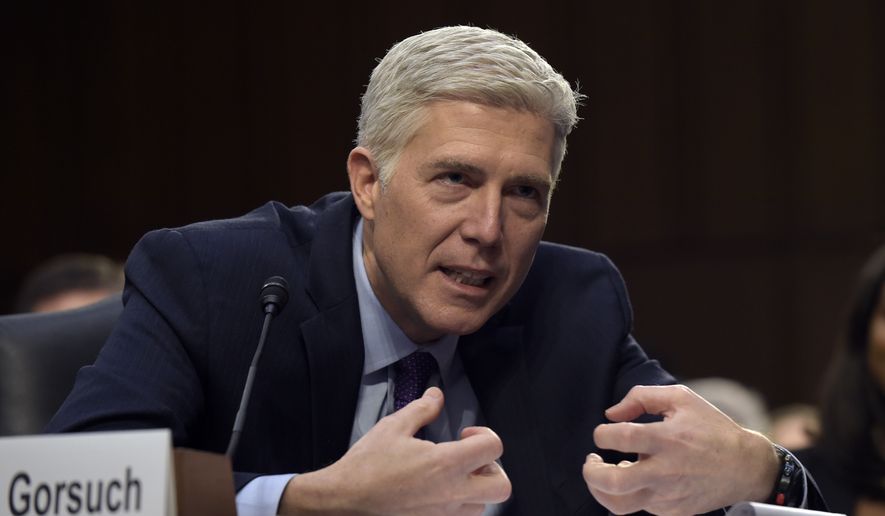Judge Neil Gorsuch repeatedly defended an “undocumented immigrant” against the massive crush of the administrative state during his confirmation hearing Tuesday, picking a fascinating fight with his potential future colleagues on the Supreme Court.
The case he was referring to — a 2016 ruling from the 10th U.S. Circuit Court of Appeals, in which he wrote both the opinion of the court and, strikingly, a separate concurring opinion — has become a major flash point in his quest to win a seat on the Supreme Court.
In the case, Judge Gorsuch ruled that he had to follow a 1984 Supreme Court precedent and show deference to the decisions of the agencies that make up the massive federal bureaucracy. But in his concurrence, he also warned that the justices might need to revisit their doctrine and rebel against the bureaucrats.
“When, with all respect, a bureaucracy can overrule neutral dispassionate judges on the meaning of a law based on their political whims at the moment, that’s a separation of powers issue, I think. And, maybe an equal protection issue, too,” the judge said.
The case involved an illegal immigrant, Hugo Gutierrez-Brizuela, who found himself caught in a tangle of federal law. One part of the law said he could apply for special consideration from the Homeland Security secretary, while another part said that because he’d been in the U.S. illegally for so long, he had to go home for at least 10 years before gaining legal status here.
Judge Gorsuch’s court had ruled that the first law, allowing for special consideration, trumped the other. But the Board of Immigration Appeals, a federal agency, said the 10-year bar was more important. It also said that decision applied retroactively, forcing Mr. Gutierrez to have to start over, and wait 10 years.
The judge said he had no choice. Because of the Supreme Court’s precedent in what’s known as the Chevron ruling, he had to defer to the immigration board.
But he wrote his concurrence to raise the fact that what’s become known as “Chevron deference” may have run its course.
“There’s an elephant in the room with us today,” he wrote. “Maybe the time has come to face the behemoth.”
Judge Gorsuch used the case during his confirmation hearing to argue he would rule for any litigant, no matter who it was.
The judge studiously referred to Mr. Gutierrez as an “undocumented immigrant.” At one point Tuesday he called the man an “alien” — the official term used in the law — then quickly apologized and called him an “immigrant” instead.
“To me that just seems he had the rug pulled out from underneath him. I think a person in this country should be allowed to rely on the law,” Judge Gorsuch said.
For Democrats, the judge’s concurring opinion — even though it sided with the illegal immigrant — was worrying.
Sen. Al Franken, Minnesota Democrat, said it was an indication Judge Gorsuch was an ideologue.
“This is a big deal,” Mr. Franken said. “I think some of those signals have already been sent.”
Conservatives, meanwhile, have cited the judge’s wariness of Chevron deference as a key indicator that they can rely on him if he’s confirmed to the high court. The Trump White House has even described that case — a judge ruling against the executive branch — as a key reason Judge Gorsuch was picked.
The judge, however, cautioned against reading too much into his warning, saying he was merely raising the matter for the Supreme Court.
“My job as a circuit judge is when I see a problem, I tell my bosses about it,” he said.
He refused to say what he would do on the high court.
• Stephen Dinan can be reached at sdinan@washingtontimes.com.




Please read our comment policy before commenting.